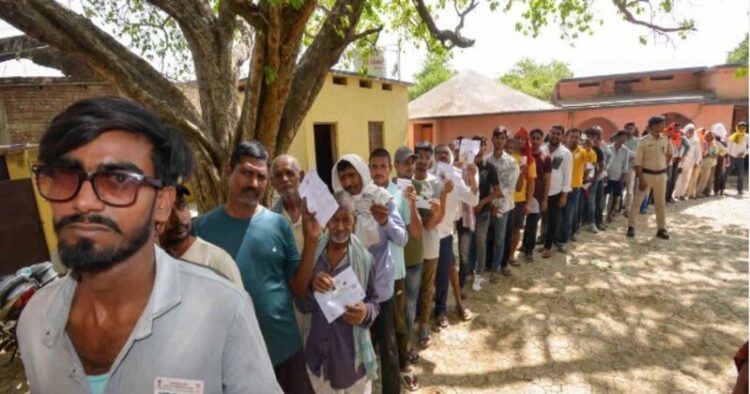The first phase of Lok Sabha polling in Tamil Nadu concluded without major incidents of violence or irregularities, but it highlighted the perpetual dominance of established political alliances and the limited impact of independent candidates in the state’s electoral landscape.
In a state known for its bi-polar contest between Dravidian parties, the Lok Sabha elections have historically seen national parties aligning themselves with either the DMK or the AIADMK. The prospect of a third front or independent candidates significantly altering the political dynamics remains negligible.
Despite the increasing number of independent candidates contesting each election, they have consistently failed to secure victories. In the recently concluded polls, out of a total of 950 candidates, 609 were independents. However, none of them managed to clinch a seat, with all 562 forfeiting their deposits. Even though independents collectively garnered 7.26 percent of the total valid votes, their electoral impact remains insignificant.
This trend has persisted for over two decades, with independents unable to break the stronghold of established political parties. While they may find success in local body elections due to factors like personal influence and community connections, their performance in Lok Sabha and Assembly polls remains lacklustre.
Notable exceptions include Congress leader Vazhapadi K Ramamurthy, who won the Salem Lok Sabha seat as an independent candidate in 1998 with the support of the AIADMK-led NDA coalition. Additionally, TTV Dhinakaran’s victory in the RK Nagar Assembly by-poll in 2017, amidst allegations of voter bribery, stands as a rare instance of independent success.
The political battleground of Tamil Nadu has witnessed a complex interplay of alliance formations and independent candidatures, shaping the state’s electoral landscape over the years. The dynamics of alliances and independent forays continue to evolve, with significant implications for the state’s political trajectory.
Historically, Tamil Nadu’s electoral arena was dominated by the Congress party, led by stalwarts like K Kamaraj, during the initial years post-independence. However, it was C Rajagopalachari, popularly known as Rajaji, who introduced the concept of alliances in the state’s politics. The DMK-led alliance, in which Rajaji’s Swatantra Party was a partner, marked a significant shift in Tamil Nadu’s political landscape, ending the Congress monopoly.
Subsequent political developments, including the split within the Congress party led by Kamaraj and Indira Gandhi in 1969, further reshaped the state’s political terrain. The emergence of alliances became a strategic imperative for parties vying for power, leading to coalitions between the DMK and various partners, including the CPI and Congress factions.
Over the years, both the DMK and AIADMK have forged alliances with national parties like the Congress, Janata Party, Janata Dal, and BJP, albeit without power-sharing arrangements or common minimum programmes initially. However, the dynamics changed with the formation of the United Front in 1996, wherein the DMK, along with GK Moopanar’s TMC, emerged as a crucial ally, demanding cabinet berths in exchange for their support.
The BJP’s experience with alliance politics in Tamil Nadu has been nuanced, marked by cautious engagements and strategic calculations. After a bitter episode with Jayalalithaa, who toppled the Vajpayee government, the BJP adopted a more circumspect approach, contesting elections alone in several instances. However, in 2014 and 2024, the BJP formed alliances with regional parties like the PMK, MDMK, DMDK, and others, aiming to strengthen its electoral prospects in the state.
Amidst the alliance dynamics, independent candidates have struggled to make a significant impact in Tamil Nadu’s Lok Sabha elections. While notable exceptions exist, such as former CM O Pannerselvam’s current independent bid with NDA support in Ramanathapuram, independents have largely failed to secure victories in parliamentary polls.
In the early years, the DMK embraced alliances with independent candidates and regional parties like the TNTP and CW in 1952, signalling its commitment to broader political cooperation. However, by 1957, the party ventured into independent contesting, marking a shift towards establishing its electoral identity. Subsequent alliances with the IUML in 1962 and the Congress (Indira) in 1980 underscored the DMK’s pragmatic approach to coalition building.
Similarly, the AIADMK’s alliance trajectory reflects its adaptability and strategic acumen. From forging alliances with the Congress and CPI in 1977 to partnering with left parties and the JNP in 1980, the AIADMK has leveraged diverse alliances to consolidate its electoral base. Notable collaborations with the BJP in 1998 and 2004 further expanded the party’s political reach, showcasing its willingness to forge partnerships beyond regional confines.
In recent years, both the DMK and AIADMK have pursued alliances with a diverse array of political actors, reflecting the evolving dynamics of Tamil Nadu’s political landscape. The DMK’s alliance with the BJP, PMK, MDMK, and others in 1999 and 2004, followed by collaborations with the Congress, left parties, and regional outfits in subsequent elections, underscores its pragmatic approach to coalition politics.
Similarly, the AIADMK’s alliances with the BJP, PMK, DMDK, and others in 2019 and 2024 exemplify its strategic calculus in forging electoral partnerships. These alliances have not only enabled the parties to broaden their support base but also provided avenues for policy influence and governance.
Against the backdrop of evolving alliance dynamics, the ongoing Lok Sabha elections hold significant implications for Tamil Nadu’s political landscape.



















Comments